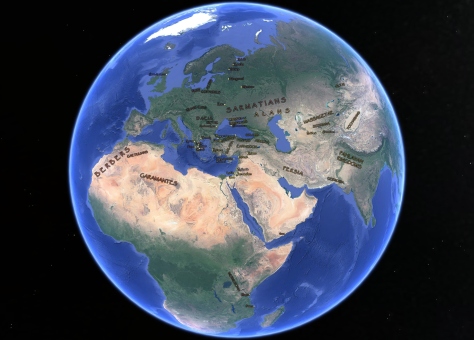Part One: Seas Red and Black
Part Two: Riders Beyond the Silk Road
Part Three: In The Country of the Man-Eaters
Part Four: The Cross on the Ice
Part Five: The Outermost Ends of the Earth
Part Six: A Cave in the Realm of the Wolf-People
Part Seven: "This Day A Martyr Or A Conqueror!"
Part Eight: Martyrdom in the Land of Lost Gods
When you look at all the locations Andrew was said to have visited, Scotland looks barely a jaunt. (Click to embiggen)
Even if only a few of Andrew's adventures have a basis in fact, the influence of the Apostle in the form of traditions, folk tales, and legends from the early days of Christianity show best when mapped out. Four journeys across three continents, dozens of lands, countless leagues, unnumbered people. And, as history has shown, such journeys are not impossible at all.
Some may scoff at the idea of The Seven Champions of Christendom declaring Andrew "born in Scotland" - he was born on the shores of the Levant, for goodness' sake! Yet Andrew was born before Scotland existed. The mythical founders of Scotland were born in Egypt and Scythia, via Iberia and Hibernia. So many quintessential Scots who weren't born here, and maybe never came here at all - and yet, we don't let wee things like that bother us.
I went on this wee journey about Saint Andrew for very similar reasons as Mr Alexandrou - to not only follow the man, but the world he lived in. It's the same with Scotland Present, Scotland Past, and the Scotland Yet To Come.
He was a humble, simple man, and for a simple man nothing is impossible. If he had been an arrogant European explorer he would never have trusted these people, he would have found his own way like Pytheas, who made a boat and sailed to Greenland from Marseilles. Although h respected their knowledge, Pytheas didn't fully trust the locals becaue he was a Greek and they were barbarians.
You see, my book is a cultural tapestry. It includes the Scythians, the ancient Scots, early Africa. It is about St. Andrew, but it is also about the world he moved in: the Slavs, the Pharisees, Epicureans, Stoics, the North Africans, the Lapp nomads, the Han Dynasty in China, the Mongols and the Turks. My editor told me, "Don't just write the life of St. Andrew, describe the places he went and the people he would have met." When I began writing about these places, I found that I had to depict the whole era - how Siberia and Finnish-Russian Karelia are connected to central Asia, Africa and Scotland - so that a reader can understand what the world was like at that time.
- Georgio Alexandrou

No comments:
Post a Comment